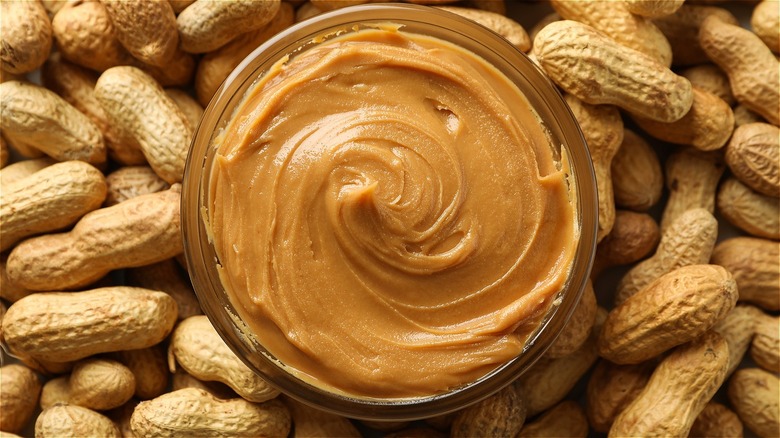Peanut Butter Is Considered A Liquid In The Eyes Of TSA
There are so many rules TSA expects you to follow that keeping up with each one of them is difficult. Guidelines aren't always clear, which is what one Twitter user encountered while going through security. "I tried to take peanut butter through airport security," he began. This proved impossible when TSA responded, "Sorry, no liquids, gels, or aerosols."
User @catholicpat was immediately confused. "I want you to tell me which of those things you think peanut butter is," he rebutted. According to TSA guidelines, "You are allowed to bring a quart-sized bag of liquids, aerosols, gels, creams, and pastes in your carry-on bag and through the checkpoint." Therefore, the Twitter user's container of peanut butter was a no-go, despite the confusion on whether it was liquid or not.
Quickly after the tweet went viral, TSA took to Instagram to confirm this was no mistake. "You may not be nuts about it, but TSA considers your PB a liquid. In carry-on, it needs to be 3.4oz or less," it wrote. The post included the definition of liquid, which is "[having] no definite shape and [taking] a shape dictated by its container." This leads to the question, why are liquids banned from airplanes anyway?
Peanut butter resembles an explosive
It's easy to be frustrated when your previously packed lunch or full tube of toothpaste is confiscated at the airport checkpoint. However, this rule is actually in place for a good reason — one you'll likely appreciate once you understand. According to CNN, the law came to be after several terrorists attempted to take down planes using liquid explosives. This 2006 incident wasn't successful, but it did make way for new guidelines to prevent a similar attack in the future. In upcoming years, it's possible that new CT scanning technology could change these laws, but not until it becomes widespread throughout airports.
Science Friday further explains why peanut butter can set off a red flag for TSA agents. Apparently, the makeup of peanut butter resembles an explosive called nitroglycerin. Both nitroglycerin and the salty spread contain hydrogen, nitrogen, oxygen, and carbon, so it wouldn't be much of a stretch that bad-to-do criminals could hide the dangerous chemical in the liquid-defined peanut butter.
Additionally, some may fear that peanut-based products could set off a reaction for those with allergies on the plane. Associate professor of pediatrics at Children's Hospital Colorado, Dr. Matthew Greenhawt, disagrees. "Look, if you have a peanut allergy, you absolutely can fly and do it safely. I see too many families that often don't go on a vacation because they're scared to fly. It's robbing them of the opportunity to live their lives," he said (via The Points Guy).

